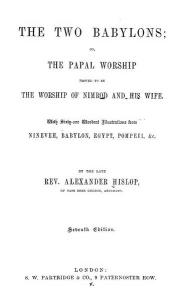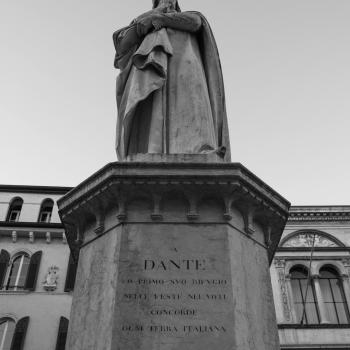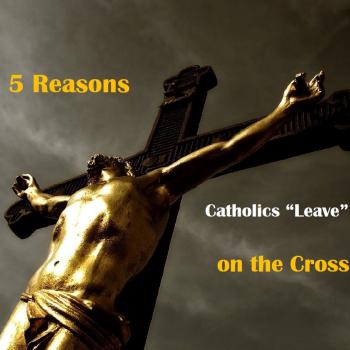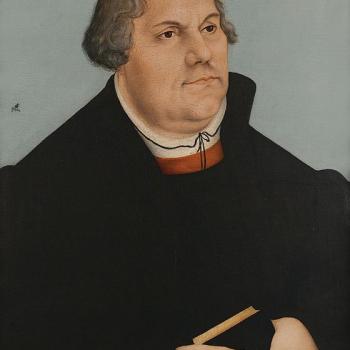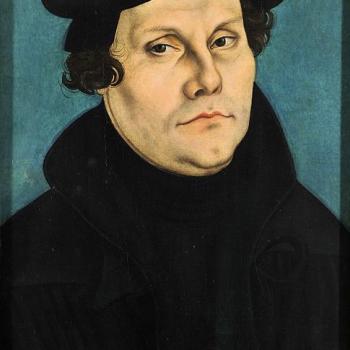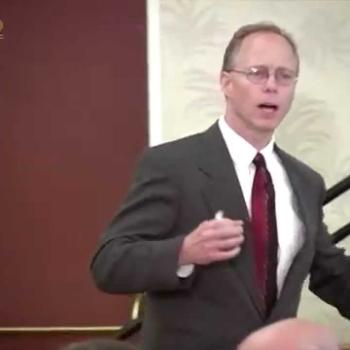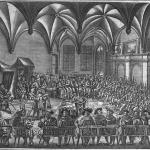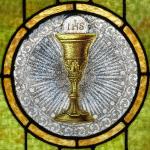[originally uploaded on 18 April 2002]
[“Truth Wherever it is Found, Ignorance, and Invincible Ignorance”]
***
“Please Hit ‘Subscribe’”! If you have received benefit from this or any of my other 4,500+ articles, please follow this blog by signing up (w your email address) on the sidebar to the right, above where there is an icon bar, “Sign Me Up!”: to receive notice when I post a new blog article. This is the equivalent of subscribing to a YouTube channel. Please also consider following me on Twitter / X and purchasing one or more of my 55 books. All of this helps me get more exposure, and (however little!) more income for my full-time apologetics work. Thanks so much and happy reading!
***
I have consistently maintained that anti-Catholic polemicists who fight against the Catholic Church and claim that it is not Christian (and – usually – that Catholics can only be good Christians to the extent that they reject the “errors of Rome”) are themselves fellow Christians, based on how Vatican II and the Catholic Church has defined that word (possessing a valid trinitarian baptism and belief in the Apostles’ or Nicene Creed).
Someone objected to this, saying that “it’s like calling the United States a ‘Christian’ nation.” That is not so because a “nation” cannot believe in the Creed or get baptized. This is a broad sociological characterization, like saying that Saudi Arabia is a Muslim nation (they’re much more Muslim than we are Christian, no doubt). My definition of Christian is specifically doctrinal and sacramental.
Anti-Catholics (broadly speaking) accept the creed, and have been baptized. They’re simply very lousy, hypocritical Christians. How they behave is beside the doctrinal, definitional point. If a whoring murderer can still be a pope, these persons can be “Christians.” The state of their soul is ultimately God’s judgment. In all likelihood, I would suspect that many anti-Catholics are out of God’s graces, whatever one calls them, and that is the bottom line. But when we start implying that they are deliberately serving the devil, as if they don’t believe in Jesus and the Resurrection, and salvation by grace, etc., then we go too far.
The “wolves-in-sheep’s clothing” metaphor based on the Bible applies to those who are pretending to be something they are not. Anti-Catholic Protestants are Christians, and they are not pretending to be Catholics. The pretense (where present) would be a lack of sincerity. “Heresy” applies to individual errors. Protestants (like Orthodox) are a bit of a special case. Luther is a heretic on any number of things, but he is a separated brother too, in virtue of his baptism and adherence to the Creed. In his case, he is also close to the Catholic Church in many ways, such as the Immaculate Conception and baptismal regeneration and disagreement with contraception. Would that most Protestants today could be as Catholic as Luther in those respects.
The obstacle of invincible ignorance is very large and sweeping indeed (and it grows as general ignorance of the faith and lack of theological education grows). Invincible ignorance, it seems to me, increases as ignorance, period, increases. I don’t see that this proposition is arguable. One would have to maintain that people today are more educated in theological matters than in, say. the 19th century. The growth of invincible ignorance follows straightforwardly from the principle “To whom much is given, much is required.” Therefore, “to whom less is given, less is required.”
God’s grace has to bring people to a place where they are interested in faith, religion, and spirituality at all. There are a host of reasons why people don’t seek to learn more about the faith, and that gets back to the psychological complexity of spirituality and conversion. They may have been shunned by a Catholic or a church unjustly, or been raised by a severely hypocritical Catholic. They may have had a whole childhood of anti-Catholic brainwashing. They may have been raised with no particular instruction in Christianity (or enthusiasm) about it at all, as I was. I couldn’t care less about Christian doctrine till I was almost 19. They may have – God forbid – been sexually abused by a priest.
God takes all this into account. As He uses us to share His message and exhibit His love, the lack of that will cause people to not follow God as well. Most of us converts needed people to help us along in our journey, by example. My brother was that person in my evangelical conversion, and my current best friend for my Catholic conversion. But what if they hadn’t been there, and my life had been different? I might have converted much later, or not at all. I believe all these factors (and a hundred more) figure into invincible ignorance and culpability.
Some seem to think these matters are very simple; I think they are extremely complex, at least subjectively. Among those who are already motivated to seek out spiritual truth, which involves all the other cultural, educational, familial, psychological factors already mentioned, surely there would be less invincible ignorance. If people who have some religious curiosity can figure out how to click a mouse and use the Internet, then they are probably more culpable, because they will know more.
My own ecumenism hasn’t had the slightest deleterious effect on my determination to share the truth that we have the fullness of truth and Christianity in the Catholic Church. And this is true of the vast majority of apologists who are also ecumenists (being orthodox Catholics and acquainted with Vatican II). I don’t see the “traditionalists” who despise ecumenism doing much apologetics. I do see them expending oodles of energy running down the Church and (their inane title) “neo-Catholics” though. There is no contradiction between ecumenism and apologetics at all because they deal with different things: one looks for common ground and rejoices in it; the other seeks out falsehood and vigilantly opposes it wherever it is found, and defends true doctrine. Every Catholic is called to recognize both complementary truths.
One Protestant who was considering converting to Catholicism, wrote about some of these factors on Steve Ray’s Catholic Message Board (April 09, 2002 at 12:51:18):
I am a Protestant who is on the verge of deciding to join the Catholic Church . . . It really takes a lot for someone like myself who was raised in a committed Evangelical home to see the truths of Catholicism, and it doesn’t come overnight. So, you see [ecumenism] can pay off for the Church. Especially when done in a loving and patient way by an orthodox Catholic . . . if Catholicism had been presented to me in a hell and brimstone, Bible-thumping way it would have turned me off. I know you are going to say something about grace is necessary for conversion, which I agree with 100%. But I will say that a graceful presentation of the Church’s teachings helps a lot as well. I certainly am not going to take the fire and brimstone approach in discussing the Catholic Church with my wife and family — it would led to division, not conversion . . . I don’t think the traditionalists have been successful in helping win near as many converts from Protestantism . . . If you want to attack “false ecumenicalism”, go after the liberal Catholics who don’t believe what the Church teaches in the first place. They are the ones watering down the teachings of the Church, not just to Catholics, but to Protestants as well.
The contention that ecumenism by its very nature, or by logical outcome, runs counter to the impulse for seeking the conversion of Protestants or any other non-Catholics, is manifestly false. Only false ecumenism and liberal indifferentism leads to that undesirable result, which is why there is no such thing as a liberal Catholic apologist, let alone evangelist. That’s an oxymoron. Vatican II and the sort of ecumenism that I espouse has been at the forefront of the great apologetics revival and remarkable wave of conversions in our own time.
If this critique is correct (i.e., that there is a disjunction between ecumenism and apologetics/evangelism and efforts to convert people to Catholicism), we would expect to see a correlation between acceptance of ecumenism and decrease of efforts to convert Protestants. We see precisely the opposite in the obvious “control group” where we can support or disprove this thesis: Catholic evangelists and apologists: whose very goal and purpose as a calling is to facilitate conversions and strengthen existing Catholics.
And the revival we are currently in coincides with John Paul II’s pontificate and post-dates Vatican II, which stressed ecumenism so highly. We should be out there vigorously trying to convert Protestants regardless of where we come down on their “metaphysical” or “spiritual” status or the state of their souls. We can argue about that all day or we can simply go out and try to convert them. Christianity is ultimately a very practical, concrete, incarnational religion, not one of philosophical abstracts and metaphysical speculation, to the exclusion of action and orthopraxis.
The whole “salvation outside the Church” discussion becomes, in a large sense, an abstraction after a while, much like the predestination debate. We simply don’t know who will be saved, whether looking at it from the angle of predestination, free will, or the discussion about precisely how non-Catholics fit into the picture. I assert both complementary truths. I believe in the presence of much invincible ignorance. But practically speaking it has no effect on my behavior, as critics of ecumenism claim such a view should. I go out and argue just as vigorously with Protestants, as if I believed that they were all damned, being “outside the Church.” Culpability is an individual matter, as it always has been. The teaching is clear, and anyone in the Church who is lax in their duty of teaching against error will be accountable to God (James 3:1). I think of that verse often, because I am myself in a position to teach many.
The abstractions don’t matter as much as what we do with what we know. It reminds me of the wrangling over works and justification/sanctification. Good Christians on both sides believe that the Christian in good standing does many good works. Fine, so let us both go out and do them and cease the endless discussions over how they precisely fit into our fine-tuned theology. We know that Jesus asks what we did when we stand before Him, and on that both sides can heartily agree: it is good to feed the poor, clothe the naked, tend to the sick and the orphan, etc.
Likewise, whatever we believe here, we know we have to preach the fullness and necessity of the Catholic Church for salvation. The Church has stressed often that authentic ecumenism is not indifferentism. The Catholic can’t pick and choose what Catholic teachings they will emphasize and which they will chuck (including entire ecumenical councils). We must interpret them in their totality and complementarity.
I strongly disagree with the Catholic opinion that all or most anti-Catholics are deliberately following Satan and what they themselves believe to be lies. I think that is psychologically naive and absurdly simplistic. They are heretics according to wherever they deviate from Catholic teaching. But the subjective culpability is far more complex. I believe – in accordance with the teaching of Vatican II and constant Catholic Tradition – that one is always in a better place spiritually being a Catholic.
We don’t know eternal destinies, but we know this for sure, so we seek that result. It is necessary for any non-Catholic to follow truth according to the lights given them, and we are commanded to evangelize and teach our faith. That is the bottom line. The presence of widespread ignorance should make a good Catholic work to alleviate the ignorance, not accept it passively in resignation and stop trying to persuade others.
Some Catholics claim that anti-Catholic agitators and polemicists are the “false brothers” who are “slipped into” the Church by the devil. Jesus speaks of “false prophets” in Mt 7:15-20. I’m not sure that would apply to other Christians. On the face of it, I think He meant absolutely deceptive persons who are utter pretenders, just as a false Messiah, if he wasn’t the Messiah, was a deceiver, because people followed him wrongly. I think this would apply far more to the child-molesting priest than to anti-Catholic Protestants. In Acts 20:29 Paul talks about “savage wolves” who “will come in among you.” Anti-Catholics obviously have not come in among us. Quite the contrary. They oppose us, without a pretense of being among us.
It is contended by some Catholics that anti-Catholics are serving Satan. Jesus spoke this way about the most obdurate Pharisees, but even then, He condemned them according to their opposition to truth (and He knew their hearts, of course. He would have known if there was not a single one of them of the assembled group who was not a hypocrite, when He was calling them “vipers” and “whitewashed tombs”). He spoke quite differently to the open-minded, humble individuals among them (e.g., Nicodemus).
Likewise, we can’t say all anti-Catholics are serving Satan. They believe many lies, but they also believe many truths. So what do we say: if the lies they teach comprise 51% of their teaching, then they are serving the devil? So that if they change their mind on one and now the proportion of truth is 51%, they are back in the kingdom of light again?
As for calling anti-Catholic “brothers (in Christ),” I would point out that Jesus, while excoriating the seven churches in Revelation, still called them “churches.” They were legitimate, despite all. A “church” is comprised of real Christians. In fact, Jesus commends the church at Ephesus for opposing false apostles (Rev 2:2), yet rebukes them for abandoning their earlier love, and says they are in danger of losing their “lampstand” (Rev 2:4-5). He rebukes Pergamum because, although they “hold fast” His name (Rev 2:13), they allow the “teaching of Balaam” (2:14).
It is a radically mixed bag. Jesus and Paul even acknowledge the authority of Jewish leaders who aren’t Christians at all. Jesus says to follow the Pharisees’ teaching but not their example, and refers to the seat of Moses. Paul says to the high priest (not knowing who he was), “God shall strike you, you whitewashed wall!” Yet when he is informed of his identity, he backs down (Acts 23:1-5).
This being the case, I say that by analogy it is possible to speak of one as a “brother in Christ” and a “Christian” in a bare-bones, minimalist sense, all the while vigorously opposing their heresies wherever found. It is no contradiction, and it has plenty of biblical precedent. For example, Paul starts off his first letter to the Corinthians with glowing words not suggesting at all that he doesn’t regard Corinth as a legitimate church.
He calls them the “church of God” (1 Cor 1:2), uses the phrases “God our Father” (1:3), thanks God for the grace given them (1:4), says that “in every way you were enriched in him with all speech and all knowledge . . . so that you are not lacking in any spiritual gift” (1:5,7), says that Jesus “will sustain” them “to the end, guiltless in the day of our Lord Jesus Christ” (1:7-8), and notes that they “were called into the fellowship of his Son, Jesus Christ our Lord” (1:9). He calls them “brethren” (1:10). This is no different from my saying “your brother in Christ,” to anti-Catholic Christians. Then Paul starts in, lambasting and excoriating them:
1) His rebuke concerning their divisiveness (1 Cor 3:1-4; cf. 1:10-17) seems to be directed at the group as a whole, not just a few.
2) The incest spoken of in 5:1-2 was of one man, yet the whole body is rebuked for not having “mourned” that, and for failing to “remove” the incorrigible sinner.
3) Likewise concerning bringing lawsuits into the secular arena. Paul says, “. . . Can it be that there is no one among you wise enough to decide between one believer and another . . .?” (1 Cor 6:5).
4) Likewise with divisions and abuses of the Lord’s Supper (” . . . each of you . . .” 1 Cor 11:21). This is a general rebuke, directed towards practically all the members, not a dissenting minority.
5) Finally, in 2 Cor 11:4, Paul speaks of the church as a whole being prone to chasing after false teachers. This leads him into his famous “boasting” discourse. He is touting his own qualifications as an Apostle so that they won’t go running after false apostles and deceivers, and will keep to the true path (2 Cor 12:20-21).
It’s the same thing with the Galatians. He addresses them as “the churches of Galatia” (Gal 1:2) and sends them “grace” and “peace” from “our Lord Jesus Christ” (1:3) and mentions “our God and Father” (1:4). He calls them brethren in Gal 1:11, 3:15, 4:12, 28, 31, 5:11, 13, 6:1, 18 — no less than nine times. Yet what else does he say to his Christian “brethren”?:
1) “I am astonished that you are so quickly deserting the one who called you in the grace of Christ and are turning to a different gospel.” (Gal 1:6)
2) “You foolish Galatians! Who has bewitched you? . . . Are you so foolish? Having started with the Spirit, are you now ending with the flesh? Did you experience so much for nothing? . . .” (Gal 3:1, 3-4)
3) “Now . . . that you have come to know God, or rather to be known by God, how can you turn back again to the weak and beggarly elemental spirits? How can you want to be enslaved to them again? . . . I am afraid that my work for you may have been wasted.” (Gal 4:9, 11)
4) “Have I now become your enemy by telling you the truth? . . . I am perplexed about you.” (Gal 4:16, 20)
5) “For freedom Christ has set us free. Stand firm, therefore, and do not submit again to a yoke of slavery. Listen! I, Paul, am telling you that if you let yourselves be circumcised, Christ will be of no benefit to you. . . . You who want to be justified by the law have cut yourselves off from Christ; you have fallen away from grace.” (Gal 5:1-2, 4)
6) “You were running well; who prevented you from obeying the truth?” (Gal 5:7)
Now, if these not-all-that-commendable-or-praiseworthy folks can be Paul’s brothers and fellow Christians, and a true church, how is it that any Catholic can deny that characteristic to anti-Catholic Protestant Christians? Have they allowed incest in their ranks (as with the Corinthians)? Even “orthodox” Catholic bishops have wickedly allowed child molestation to go on. Yet – by logical extension – Paul would not deny that they are “brethren.” Have anti-Catholics “turned to a different gospel”?
No, not when “gospel” is defined as the apostles defined it (as I have demonstrated elsewhere). This outlook all goes back to the historic Catholic teaching that the Church (over against Donatism, Montanism, and other rigorist sects – now continued in spirit by SSPX, sedevacantists, schismatic-minded, uncharitable “traditionalists” and their ilk) has sinners and hypocrites in it, because it is institutional and visible, and given the low estate of fallen humanity.
We converts have a bit more empathy, having often been in anti-Catholics’ shoes ourselves. I was never anti-Catholic myself, but I know what I knew and didn’t know in my evangelical period, and I know I was following God with perfect sincerity, according to what I knew. Once I learned some other things, I was quickly converted, in less than a year’s time. There are thousands of non-Catholic Christians like that, including anti-Catholics. They have to overcome a ton of false information to convert.
I had less to overcome than most, because I hadn’t been brainwashed; hence the rapidity of my journey. And if they can do that, then surely grace had been working in them for some time. And if that is true, they were not serving Satan or deliberately resisting what they know to be true (not even, I believe, most anti-Catholics). No, they were among those of whom Fulton Sheen spoke:
There are not over a hundred people in the United States who hate the Catholic Church. There are millions, however, who hate what they wrongly believe to be the Catholic Church — which is quite a different thing.
I’ve yet to meet an anti-Catholic who properly understands what it is they are attacking. That goes all the way back to Luther. I agree with Fulton Sheen. Anti-Catholics don’t know that the Catholic Church is the Bride of Christ, as Sheen says. They sincerely believe a falsehood, in ignorance. That is my point, and it is a very simple one. And simply being told truth cannot quickly or easily overcome mountains of prejudices, dispositions, biases, false paradigms and worldviews, truckloads of individual lies told about the Church, a vigorous and systematic opposing view which appears altogether plausible to them, emotions, family, background, culture, oftentimes hostile spouses, possible loss of jobs or resultant persecution, etc. People with this baggage cannot yet hear the truth.
Conversion is extraordinarily complex psychologically. I know a little about that because I have undergone many conversions in my own life (e.g., besides Catholicism, to evangelicalism, to pro-life, to sexual traditionalism, to creationism, to political conservatism), and I also have a minor in psychology and a major in sociology (not worth much, but they offer some slight insight into human behavior). I wasn’t fortunate enough to be born into the fullness of Catholic truth. I had to work to arrive at every major truth I came to espouse.
To acknowledge invincible or otherwise significant ignorance, therefore, is to acknowledge psychological and sinful (and biblical) reality. I don’t recall Vatican II saying that Protestants are “separated brethren” except when they are anti-Catholic. I am following the Bible and Vatican II and other official Church documents.
Anti-Catholics may intellectually know what Catholic doctrines are. But they have – in most cases of virulent anti-Catholicism – extraordinary obstacles to overcome in order to come to a place where they really, truly believe Catholic truth is true, and yet reject it, like Satan would have rejected God, knowing full well that he had no legitimate grounds to do so. In other words, the interior, psychological, subjective dimension is supremely important to consider. Karl Adam, in his classic, The Spirit of Catholicism, wrote:
From the purely theological standpoint,…….the only possible conclusion regarding all heretics and schismatics, Jews and pagans, is that judgment of condemnation which the Council of Florence [1438-1445] pronounced upon them………[p.181]…….It is thus, from this purely theological standpoint, that we are to understand the sharp anathemas pronounced by the Church against all heretics and schismatics………In these pronouncements the Church is not deciding the good or bad faith of the individual heretic. Still less is she sitting in judgment on his ultimate fate. The immediate purport of her condemnation is that these heretics represent and proclaim ideas antagonistic to the Church. When ideas are in conflict, when truth is fighting against error, and revelation against human ingenuity, then there can be no compromise and no indulgence…….Dogmatic intolerance is therefore a moral duty, a duty to the infinite truth and to truthfulness.
But so soon as it is a question, not of the conflict between idea and idea, but of living men, of our judgment on this or that non-Catholic, then the theologian becomes a psychologist, the dogmatist a pastor of souls. He draws attention to the fact that the living man is very rarely the embodiment of an idea, that the conceptual world and mentality of the individual are so multifarious and complicated, that he cannot be reduced to a single formula. In other words the heretic, the Jew and the pagan seldom exist [p.182] in a pure state……..Therefore the Church expressly distinguishes between “formal” and “material” heretics. A “formal” heretic rejects the Church and its teaching absolutely and with full deliberation; a “material” heretic rejects the Church from lack of knowledge, being influenced by false prejudice or by an anti-Catholic upbringing. St. Augustine [354-430] forbids us to blame a man for being a heretic because he was born of heretical parents, provided that he does not with obstinate self-assurance shut out all better knowledge, but seeks the truth simply and loyally (Ep. 43,1,1). Whenever the Church has such honest enquirers before her, she remembers that our Lord condemned Pharisaism but not the individual Pharisee, that He held deep and loving intercourse with Nicodemus, and allowed Himself to be invited by Simon……
The religion of the medieval man embraced his whole life and outlook……So that every revolt against the Catholic faith seemed to him to be a moral crime, a sort of murder of the soul and of God, an offence more heinous than parricide. And his outlook was logical rather than psychological. He rejoiced in the perception of truth, but he had little appreciation of the living conditions of soul by which this perception is reached…….In dealing with the living man we have to take account not only of the logical force of truth, but also of the particular quality of the mental and spiritual endowment with which he reacts to the truth. Because they were not alive to the infinite variety of such spiritual endowment, they were all too ready, especially when truth was impugned, to conclude at once that it was a case of “evil will” (mala fides) and to pass sentence of condemnation, even though there were insuperable intellectual obstacles (ignorantia invincibilis) in the way of the perception of the truth. This pre-eminently logical attitude of mind is characteristic of the Middle Ages. That epoch had no feeling for life as a flowing thing with its own peculiar laws, no appreciation of history, whether within us or without us.
. . . The theologian has by means of psychological and historical studies attained a wider understanding and become increasingly cautious in attributing an “evil will” to the heretic. He has become more alive to the thousand possibilities of invincible and therefore excusable error…….
Wherefore the Church’s claim to be the Church of salvation by no means excludes a loving and sympathetic appreciation of the subjective conditions and circumstances under which heresy has arisen. Nor is her condemnation of a heresy always at the same time a condemnation of the individual heretic……[p.185] …… So that the non-Catholic of good will is already fundamentally united to the Church. It is only that he sees her not. Yet she is there, invisible and mysterious. And the more he grows in faith and in love, the more plainly will she become actually visible to him…..And it is because we believe that very many non-Catholics are already thus invisibly united with the Church, that we do not abandon [p.186] our conviction that this invisible union will one day be made visible in all its beauty. The more consciously and completely we all of us exhibit the spirit of Christ, the more certainly will that hour of grace approach, when the veils will fall from all eyes, when we shall put away all prejudice and misunderstanding and bitterness, when we shall once again as of old extend to one another the hand of brotherhood, when there shall be one God, one Christ, one shepherd and one flock.
The Church is much slower to make the charge of evil will (mala fides) than it used to be, and that is a very good thing. This is a very positive development of ecumenical understanding.
When Paul ceases calling the Corinthians and the Galatians “brethren” and being charitable (while strongly rebuking them), then I will as well. As that isn’t likely (he being dead), the task of the person who claims that anti-Catholics aren’t Christians is to explain these writings of Paul, and to show how anti-Catholics are in an essentially different category than people who are allowing incest or the teachings of Balaam, following a different gospel, losing their first love, etc.
If we cease being charitable, we show ourselves the same as they are in that respect. Let them hate us if they must (and I have been falsely accused of hatred myself, by some of them). I will not return the hatred. Part of charity is believing the best of someone, and hoping all things (1 Cor 13:7). That applies to anti-Catholics, as to anyone else. And that is why I keep trying to reconcile with them. Seventy times seven. At the same time, I don’t give any quarter at all, as to their false doctrines. So why should anyone object to simply calling them “brothers in Christ”?
The word “Christian” is used repeatedly in the Decree on Ecumenism, in a sense obviously wider than being merely a synonym of “Catholic.” I presuppose the authority of the Council and its teaching in my analysis (and also that of papal encyclicals). For example, in Ut Unum Sint, the pope writes in the Introduction:
. . . besides the doctrinal differences needing to be resolved, Christians cannot underestimate the burden of long-standing misgivings inherited from the past, and of mutual misunderstandings and prejudices. Complacency, indifference and insufficient knowledge of one another often make this situation worse.
Note the use of the word “Christian,” and that there are problems beyond just doctrine, including prejudices and so forth, which we must not “underestimate.” In section 42, the Holy Father refers to “a certain aggressiveness or a spirit of vengeance” and says that people of good will:
. . . have not been able to transform every situation where brutal conflict rages. In such circumstances those committed to ecumenism are often required to make choices which are truly heroic. It needs to be reaffirmed in this regard that acknowledging our brotherhood is not the consequence of a large-hearted philanthropy or a vague family spirit. It is rooted in recognition of the oneness of Baptism and the subsequent duty to glorify God in his work.
And in section 66:
. . . the Decree [on Ecumenism] observes that the ecumenical movement and the desire for peace with the Catholic Church have not yet taken root everywhere [sec. 19]. These circumstances notwithstanding, the Council calls for dialogue.
A fellow Catholic apologist stated that my position might be inconsistent with 1 Corinthians 5:9-13. I replied that the main thing in the passage that (arguably, often) applies to anti-Catholics is the “reviler” or “slanderer” label (cf. also 1 Cor 6:10) . I agree that it is possible and quite plausible grounds for questioning the Christian status of many anti-Catholics, on the moral basis established in this passage and others, as opposed to the strictly doctrinal. Anti-Catholics think Catholics are idolaters. That’s enough for them to separate from us, using this same passage.
If we are too quick to make these judgments, we become in some ways the very thing that we (at least speaking for myself, anyway) despise in anti-Catholics. I have always tried to give people the most benefit of the doubt possible, in charity, and in understanding of the extreme complexity of human psychology, because I think this is scriptural (1 Cor 13:7), and not an optional thing at all. It’s rarely applied in real life, but what else is new? No one ever said Christianity was easy or intuitive to human nature. As Ringo Starr sang, “It Don’t Come Easy.”
In fact, yet another example of Paul’s approach is shown in the immediate context of the contrary proof text of 1 Corinthians 5:9-13. For in 1 Corinthians 5:3-5 Paul urges the church to hand the incestuous man “over to Satan for the destruction of the flesh, so that his spirit may be saved . . . ” This is an example of penance, or church discipline. What is interesting, however, is that Paul reverses this penance in 2 Corinthians 2:6-11, in what might be called an indulgence (I used this dual example as just that, in my book, A Biblical Defense of Catholicism).
Objectively, many if not most anti-Catholics have lied and slandered about the Catholic Church and Catholics. There can be no doubt about that. But – as for subjective culpability — that gets right back to all the influences on them that cause them to act as they do towards Catholics in the first place. And they have also been provoked (made to stumble? – see Rom 14:13-15,19,21) by Catholic apologists. There are many condescending “hit pieces” done about Anti-Catholics in Catholic websites and magazines, where their internal states of mind and heart and motives are pilloried.
Sadly, many Catholic apologists slander and lie about anti-Catholics or their beliefs as well. We frequently say bad things about them. And some of these lies are the charges that they are serving Satan, or are insincere, or demon-possessed, or not Christians. Most anti-Catholics are not monsters; they are not evil through and through. They have been hurt and have gone through bad experiences like we all have. And that causes them to do dumb and stupid things in reaction (again, something we are all quite familiar with in ourselves).
The language of 1 Corinthians 5:9-13 is obviously applying to those who are absolutely unrepentant and inveterate sinners, characterized beyond a doubt by the vices mentioned. But what would happen if we applied it with absolute strictness? “Sexually immoral persons.” Where does one draw the line on that? I think many, many Christians (if we’re honest with ourselves and others) struggle with lust and impurity fairly often. We do it repeatedly. Presumably we repent, but we keep doing it. Jesus made lust almost the immoral equivalent of adultery. Does that mean we are in this category, and so should stop being associated with by other Christians? The “greedy”? I don’t want to get started with a critique of the gross materialism of America and many who seem to be more capitalist and/or pragmatist than Christian.
Christians of all stripes are shot-through with that failing. How do we determine who is greedy, and how often is that ever done in Catholic (or other Christian) circles? Virtually never. We’re much more likely to cater to the rich and because we can get something out of them (James 2:1-10). When was the last time any of us heard an admonition to a “rich young ruler” to give up all their riches, which have become their idol? My point is that a Puritan-like application of this passage is a little more difficult and troublesome than might first appear. And yes, I think “he who is without sin can cast the first stone” has some application.
So we object to anti-Catholics slandering the Church and the Blessed Virgin Mary? People almost always do that when they’re ignorant and sincerely deluded and dead-wrong. If anti-Catholic Protestants truly knew our Mother like we do, they wouldn’t even have the desire to do such a thing. It would never cross their minds. They truly believe with all their heart that she is not the Mediatrix, Immaculate, etc.
In their minds, they are not slandering her as they believe her to be; they are simply fighting what they deeply believe to be false doctrine, just as we fight them on the same grounds, but as Catholics, we feel duty-bound to defend the honor of our Lady. Same thing with the Church. If the anti-Catholic truly understood Her, he wouldn’t fight Her as he does. Virtually all anti-Catholics are in that huge majority of folks greatly mistaken about Catholicism, that Fulton Sheen talks about.
Much more of this determination to read folks out of Christianity, to the exclusion of the really important things of Christianity and we are in danger of becoming like the Pharisees:
. . . you tithe mint, dill, and cummin, and have neglected the weightier matters of the law: justice and mercy and faith . . . you strain out a gnat but swallow a camel. (Mt 23:23-24).
None of us know the eternal destiny of any anti-Catholic or the state of anyone’s soul in all its particulars. All we can do is fight anti-Catholic falsehoods, pray, and hope for the best, including repentance from lying and heresies, and sinful opposition to the Church.
*
Practical Matters: Perhaps some of my 4,600+ free online articles (the most comprehensive “one-stop” Catholic apologetics site) or fifty-five books have helped you (by God’s grace) to decide to become Catholic or to return to the Church, or better understand some doctrines and why we believe them.
Or you may believe my work is worthy to support for the purpose of apologetics and evangelism in general. If so, please seriously consider a much-needed financial contribution. I’m always in need of more funds: especially monthly support. “The laborer is worthy of his wages” (1 Tim 5:18, NKJV). 1 December 2021 was my 20th anniversary as a full-time Catholic apologist, and February 2022 marked the 25th anniversary of my blog.
PayPal donations are the easiest: just send to my email address: apologistdave@gmail.com. Here’s also a second page to get to PayPal. You’ll see the term “Catholic Used Book Service”, which is my old side-business. To learn about the different methods of contributing (including Zelle), see my page: About Catholic Apologist Dave Armstrong / Donation Information. Thanks a million from the bottom of my heart!
*
***
Photo credit: CrossReach (7-5-16). Cover of the 7th edition of The Two Babylons, from 1871. [Wikimedia Commons / Creative Commons Attribution-Share Alike 4.0 International license]
Summary: A Christian is a Christian, regardless of whether they wrongly think other sorts of Christians aren’t Christians. Catholics don’t read anti-Catholics out of Christianity.


